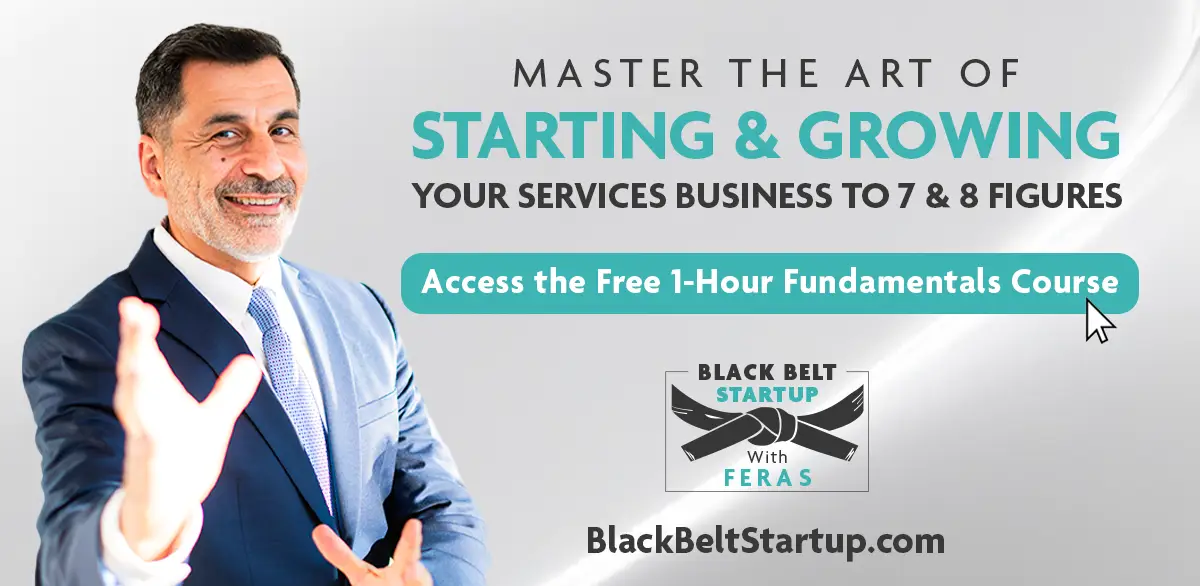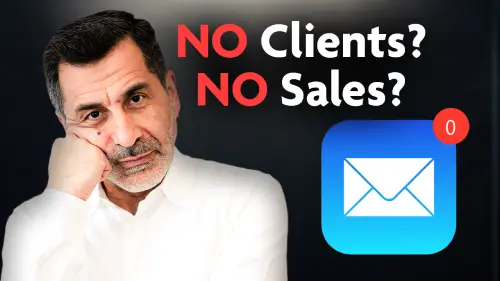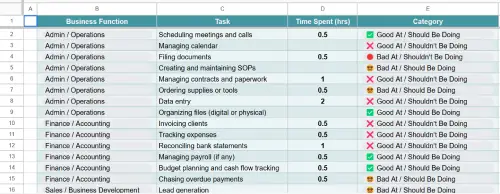Confused Why Leads Don’t Buy?

Good Morning!
This past week marked National Volunteering Week. Volunteering has always been a significant part of my life, at times taking over my professional and personal life.
In fact, in 2019, after e-Nor was acquired, I was fortunate to fulfill a long-time dream: dedicating a couple of years to pro-bono work for causes I deeply believed in.
Even with a very busy entrepreneurial schedule, I highly encourage you to give to nonprofits. Even if it’s an hour of your time or $10 a month. What you gain from giving far exceeds what the recipient receives.
On the Mat
- Defining Your ICP
- Is Your Business Idea Good?
- Stop Working So Hard
- VentureKit – AI Tool to Kickstart Your Business
- How to Narrow Down Your Target Audience (and Create a Campaign)
- New Tool: Founder Schedule Optimizer
Let's Train
How to Define Your Ideal Customer Profile (ICP)
If your sales calls feel scattered or your marketing isn’t landing, you’re probably missing a clear Ideal Customer Profile. This week’s newsletter outlines a tactical, founder-friendly process for identifying your Ideal Customer Profile (ICP), the individuals most likely to derive value from your services and agree to work with you.
It starts by mapping your zones of expertise, not just what you’re good at, but what you have evidence for (results, testimonials, credentials) and what you enjoy doing enough to scale around. Think of it like triangulating your sweet spot: high skill, strong proof, and energy for the work.
Once you've ranked your zones, flip the lens. Ask:
- Who benefits most from this expertise?
- What problems are they navigating right now?
- What’s at stake if they don’t solve it?
This part isn’t about pure surface-level details, it’s about empathy and context. You’re not looking for vague buyer personas, you’re building a real-world snapshot of a person or business that needs your help today.
From there, validate with market context: Are there enough of these people? Can they pay? Are they actively searching for help, or will you need to create demand?
Then, test it.
Use your Ideal Customer Profile (ICP) to guide everything you say. Shape your emails, your website, and your client calls around their real problems and goals.
Let’s say your ICP is busy accountants who need marketing help, your messaging should focus on “getting more clients without working longer hours.”
When you speak directly to their needs, the right people will feel like you understand them, and they’ll be more likely to hire you.
Treat your ICP as a working hypothesis. Expect it to evolve based on real-world feedback, not guesswork. Talk to leads about their pain points, research your audience’s challenges, and study what your competitors are doing.
You won't get your ICP perfect on day one, and that’s okay. What matters is staying alert to what sticks, adjusting based on what you see, and narrowing it down over time.
A clear ICP is more than just good positioning, it's your filter for who to pursue, what offers to build, and how to articulate the value you bring.
If you're tired of guessing who to target or why your offer isn’t landing, don’t stop here. The full article shows you exactly how to map, validate, and refine your ICP so you stop wasting time on the wrong people.
Ask Feras Recaps
Want to know if your business idea is any good?
It doesn’t matter what I think or what anyone else thinks. The only opinion that counts is the market’s.
A while back, I advised Dr. Thomas, a successful dermatologist launching a second business: a specialized remote dermatology consultation service. He’s dedicated, putting in 20 hours a week and even bringing on partners. But his plan had serious gaps.
🔥 Challenge:
- No customer research or audience validation
- No written business plan
- Verbal-only agreements with equity partners
- Overlooking key legal and compliance issues
💡 Doing Right:
- Strong work ethic and commitment
- Set aside seed funding
- Recruited help in areas outside his expertise
- Recognized a real gap based on patient conversations
🛠️ My Recommendations:
- Pause all tech development
- Conduct targeted customer interviews (at least 25)
- Vet competitors and pricing models
- Write a business plan backed by research
- Hire a lawyer and formalize all equity agreements
- Ensure compliance in every operating location
- Test the concept in one small market before scaling
📈 The Path Forward
Dr. Thomas has the drive. But before moving forward, he needs to replace hustle with structure. The difference between a great idea and a disaster? Planning, protection, and real market validation.
Ideas are cheap. Execution, guided by studying the market, is everything.
Watch the story here.
Details have been changed to protect anonymity and for storytelling purposes.
You Might Like These
Does Hard Work Really Matter?
I'm working on a new YouTube video about hard work—and how my view has evolved.
I used to think hard work was the key to success. Now? I still believe hard work is essential, but it’s not enough.
Shaan Puri recently shared his take: if you find what you love and become the best at it, you’ll be wildly successful.
I don't fully disagree, but I’m skeptical. Most people don't fall in love with Excel sheets, noodles, or tire changes—yet some still build extraordinary businesses around them.
It’s a short, thoughtful read if you want a fresh perspective. More from me on this soon.
If you’re trying to turn your skills or expertise into a business, the hardest part is often just getting the first version of your plan together.
VentureKit helps with that. It’s an AI tool that asks you a few questions about your idea, then generates a customized business plan—including customer acquisition strategies, pricing models, and operational checklists.
It won’t replace deep thinking, but it’s a great way to build momentum when you’re starting from scratch. A strong first draft beats staring at a blank page.
Sharpen Your Blade
If you’re selling to everyone, you’re selling to no one. That’s why we talked above in the main section about ICPs. Another less fancy term for it is “target audience.”
In this more tutorial like video, I go through how to exactly narrow down your target audience and create a paid Meta ad campaign that targets your target audience.
I also cover other ways you can try to get find your audience.
The goal isn’t the meta add or some of the other ways I share but rather how you can narrow down an audience and figure out ways to find them/get in touch with them.
If you want a hands one walkthrough, this video is for you.
One of the biggest traps founders fall into is spending time on the wrong things. That's why I built the Founder Schedule Organizer—a tool to help you audit how you're spending your time and realign your focus.
Here's how it works:
- First, list all your recurring tasks.
- Then, categorize them based on your skill level (good at vs. not good at) and business phase (what you should vs. shouldn’t be doing right now).
- Finally, track your time over a few weeks and map tasks to the right actions: delegate, automate, eliminate, or double down.
The goal is simple: spend more time on high-impact work that actually grows your business, and systematically clear out distractions.
Subscribe to the Black Belt Startup Newsletter
Weekly, 5-minute insights to help you escape the 9–5, land your first clients, and grow a thriving business.




